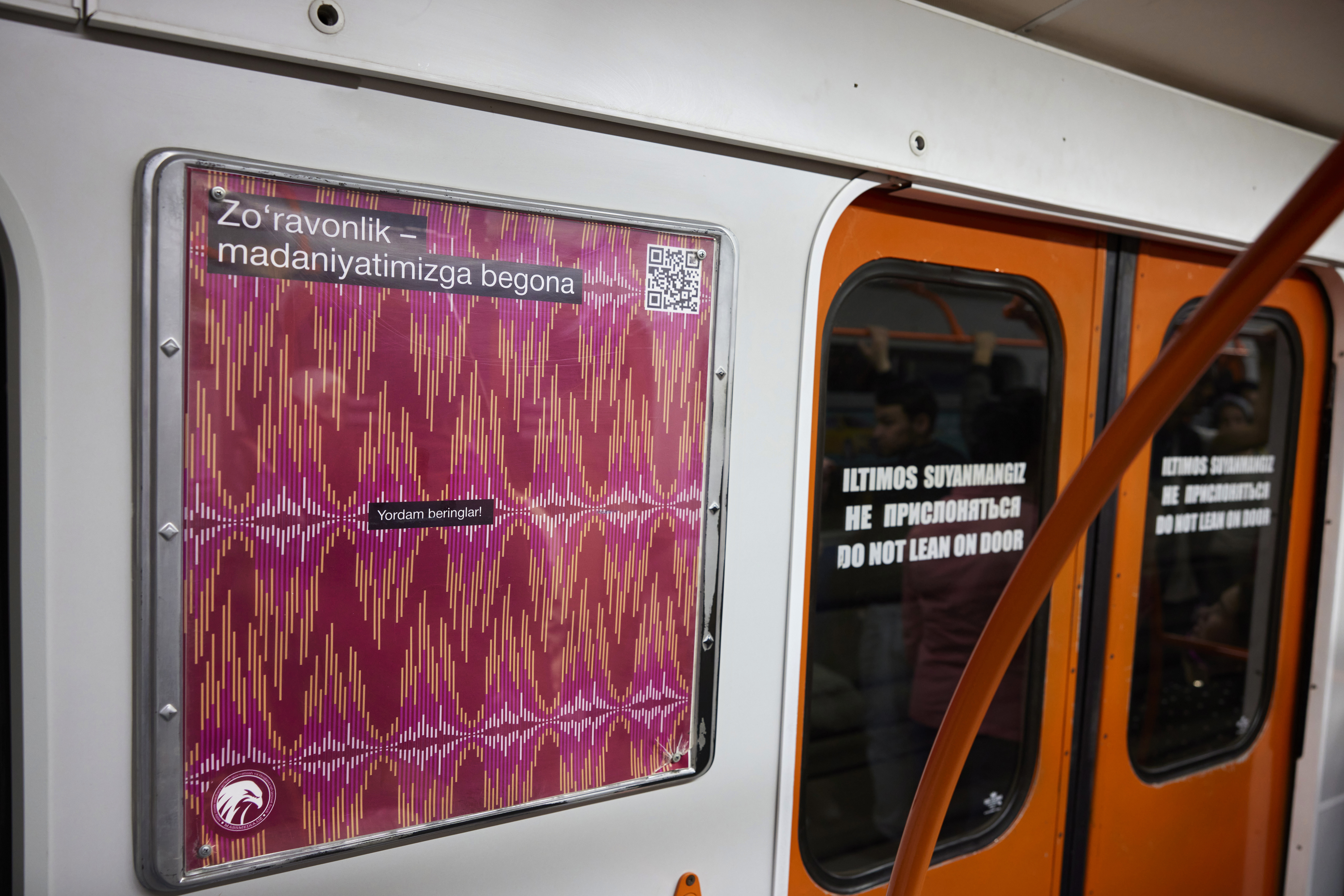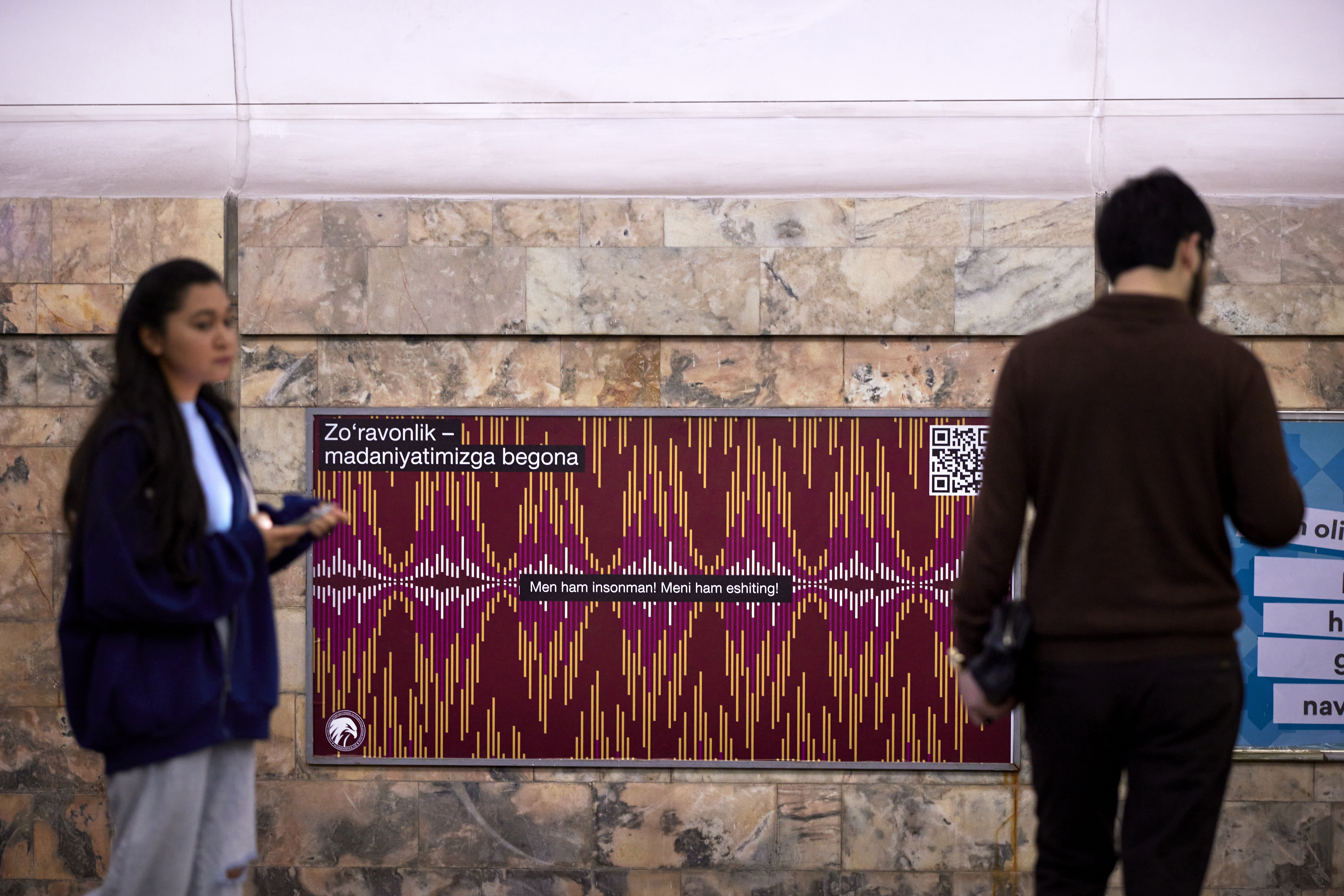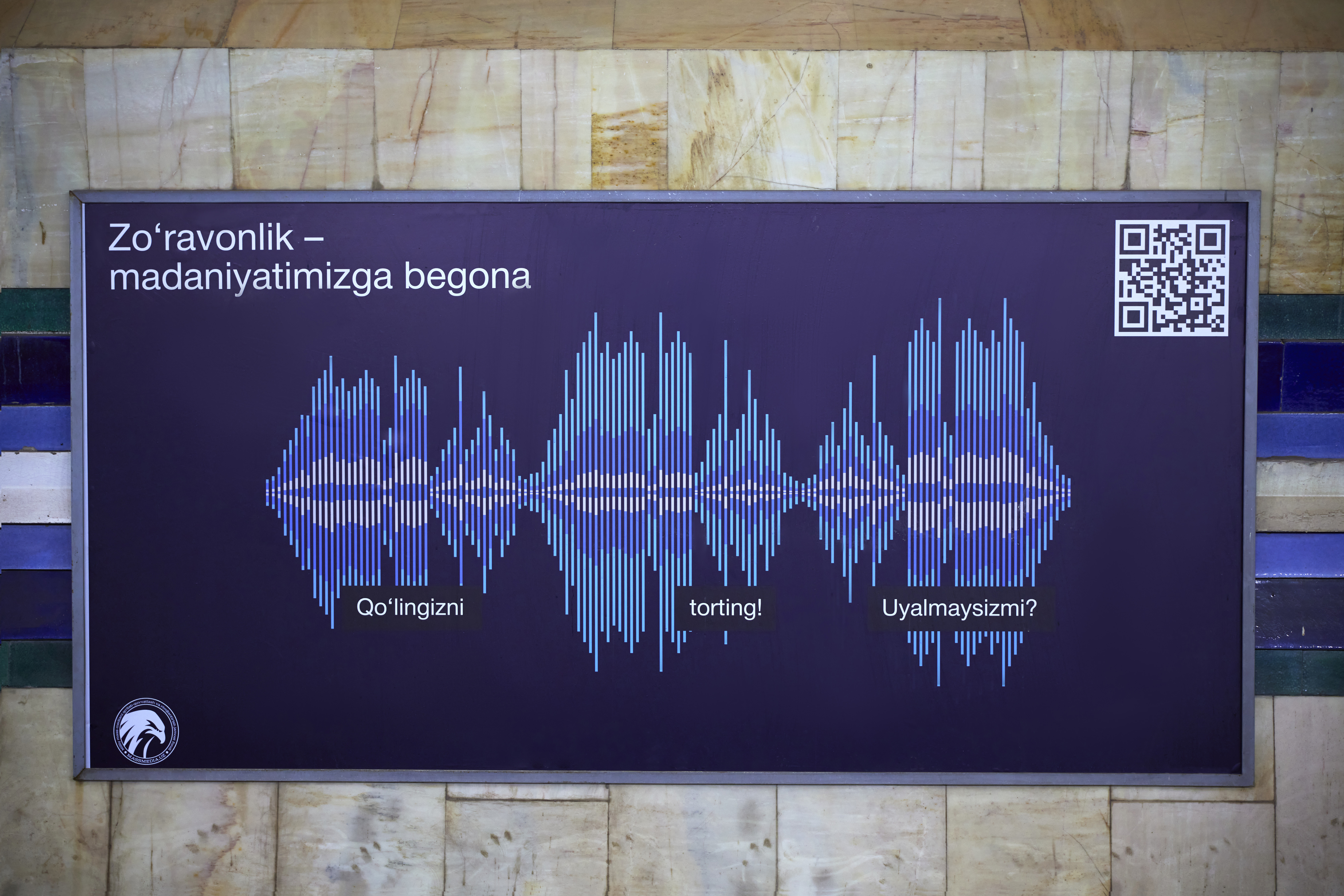Every day, around 350,000 people ride the Tashkent Metro. Built during the Soviet period, it was the first subway in Central Asia. A group of civil society activists decided to launch a campaign in the Tashkent Metro “to draw the attention of the Uzbek public to awareness of violence against women, its prevention and alleviation of its complications,” as stated in their official website nolalar.com (nolalar means wailings in Uzbek). For a couple of weeks, the Tashkent Metro, papered with campaign banners, decried “Violence is foreign to our culture” – a controversial slogan given the pervasive nature of violence against women and girls in Uzbekistan.
The campaign banners feature a creative fusion of multicolor traditional adras fabrics, a dye-resistant wool-cotton textile with abstract patterns, and sound wave equalizers – a symbolic design to represent the voices of Uzbek women whose cries for help are muted. “We started learning [about] the problem of violence [against women], collected many materials where women are beaten, where [a bride] is beaten at a wedding, where women ask for help and [bystanders] film that on camera,” says Akhmad Sobitov, the creative director who initiated the campaign, in an interview for the Diplomat. “And we had an idea to record those on [an] iPhone’s Dictaphone and make national ornaments out of those voice waves… not the décor patterns used in architecture or traditional applied art, but textiles that local women wear.”

Nolalar.uz campaign banner in a train in Tashkent Metro. The wailing embedded in the wave, “Help please!” Photo credit: Public Fund for Support and Development of National Mass Media
Every piece displayed in the trains and at train stations in Tashkent reverberates a different yet repeated cry for help – “I am also a human being! Listen to me too!” “Please, help!” “Take your hands off of me! Are you not ashamed?” The QR code found on the top-right corner of the banners takes you to the nolalar.com website where guidelines for seeking help and phone numbers of available call and help centers are provided.
The campaign itself is a product of volunteer efforts by a group of local civil society activists. “My team does it all for free, there is no profit,” says Sobitov. The Ministry of Transportation that oversaw the installation of the banners in the Tashkent Metro and Ahad Mix Group, a local advertising agency which is displaying animated campaign placards on LED screens across Tashkent, agreed. “If they had asked for a payment, it would have been too expensive [for us],” laughs Sobitov.
Although the most severe forms of violence take place in far regions of Uzbekistan, the campaign is running in the capital, where women are more educated and know their rights better, where they file for protection orders against their abusers the most, and where women have wider access to help-centers compared to women who live in the country’s rural regions. “As a marketing specialist, I will say that, unfortunately, the regional market in Uzbekistan is very narrow in terms of marketing. Marketing, adapted to certain regional areas, is very backward and ineffective [as of now],” Mirzayor Erkinov, another member of the team who worked on the project, explains to The Diplomat. “[We] need to plan and then only enter regions,” he continues, noting it is just the first phase of a larger campaign they hope to continue in near future.

Nolalar.uz campaign banner in a train in Tashkent Metro. The wailing embedded in the wave, “Let me go!” Photo credit: Public Fund for Support and Development of National Mass Media.
The campaign was launched with the support of the Public Fund for Support and Development of National Mass Media the same day as Tashkent announced the criminalization of domestic violence. This is another slow step Tashkent has taken to protect women and girls who are subject to abuse every day, mostly by family members – such as husbands and mothers-in-law. The prevalence of violence against women in the country is hard to measure and there are no official statistics available. Small-scale surveys and the growing number of protection orders given to women against their abusers can help gauge the scale of the plague, however.
In a 2022-2023 survey conducted by a local research institute in six regions and in Karakalpakstan found that one in three women experienced abuse from their husbands while 26 percent from their mothers-in-law. Local news outlets are rife with coverage of the most brutal forms of femicide – “husband killed his wife with a chainsaw,” “a man killed his wife by hitting her with a brick,” “a man killed his sister-in-law with a brass,” “a man stabbed his former wife to death with a knife ,” “a 22-year-old man killed his wife and son and set them on fire.”
While femicide and all other forms of violence against women are not new, the rise of the Internet and mobile devices has made it more apparent than ever, says activist Irina Matvienko. The abuse of women is so embedded in local lifestyles that until a couple of years ago domestic violence was seen strictly as a “family matter.”
“Men’s advocacy of women’s rights was something offbeat just a decade ago,” continues Mirzayor, inadvertently acknowledging the fact that all their team members are men. “I think it takes time to cure everything. Inculcating culture is also in the hands of progressive leaders of society.”

Nolalar.uz campaign banner in Tashkent Metro. The wailing embedded in the wave, “I am also a human being! Listen to me too!” Photo credit: Public Fund for Support and Development of National Mass Media
After decades of silence on the matter, only in 2018 did physical, psychological, economic, and sexual violence gain legal definitions in Uzbekistan, but not domestic violence. Despite social stigma and judgment, the number of women seeking help and voicing their grievances is also increasing. When protection orders against domestic violence were introduced in 2020, only 14,700 women filed for them, but the number more than doubled in the next two years, reaching 40,000 annually. But those numbers still do not depict the whole picture.
“Uzbek women who are victims of domestic violence keep it a secret until they are killed because it is ‘shameful.’ The officials are trying to reconcile the couple to improve the statistics,” explained a women’s rights activist, Sayyora Khodjaeva, to a local outlet last year at a conference dedicated to International Day for the Elimination of Violence against Women. “Not until he kills, of course he kills and then gets away.”
Activists believe protection orders are not effective as perpetrators almost never face administrative or criminal liability – only 7 percent of domestic violence cases reach court, leaving women helpless and hopeless. NeMolchi.uz, a local project against violence against women, remains one of the very few platforms where women safely share their suffering to remind each other that they are not alone in this struggle. The website’s popularity is a reminder of how mundane violence against women is.

Nolalar.uz campaign banner in Tashkent Metro. The wailing embedded in the wave, “Take your hands off of me! Are you not ashamed?” Photo credit: Public Fund for Support and Development of National Mass Media
Given the patriarchal nature of abuse the women of Uzbekistan live with, the slogan of this metro campaign, “Violence is foreign to our culture,” sends an aspirational message, but one that conflicts with the present reality in Uzbekistan. Not only does it not represent reality, but it sets aside the cultural underpinnings that allow violence to occur in the first place. “Our target audience is archaic people, traditionalists for whom it is difficult to refuse everyday habits, who are very sensitive toward their values [which includes viewing women as a property of men],” insists Sobitov explaining it is impossible to change the mind of people with aggressive messages that criticize local culture. “Our aim is to inject [the thought] that violence cannot be part of our culture … Culture is not an axiom – it is as dynamic as society itself. Culture changes with society and our aim is to bring society out of that [abusive] pattern.”
Civil Society Activists Launch Campaign Against ‘Culture of Violence’ in Tashkent
Source: Frappler

0 Comments